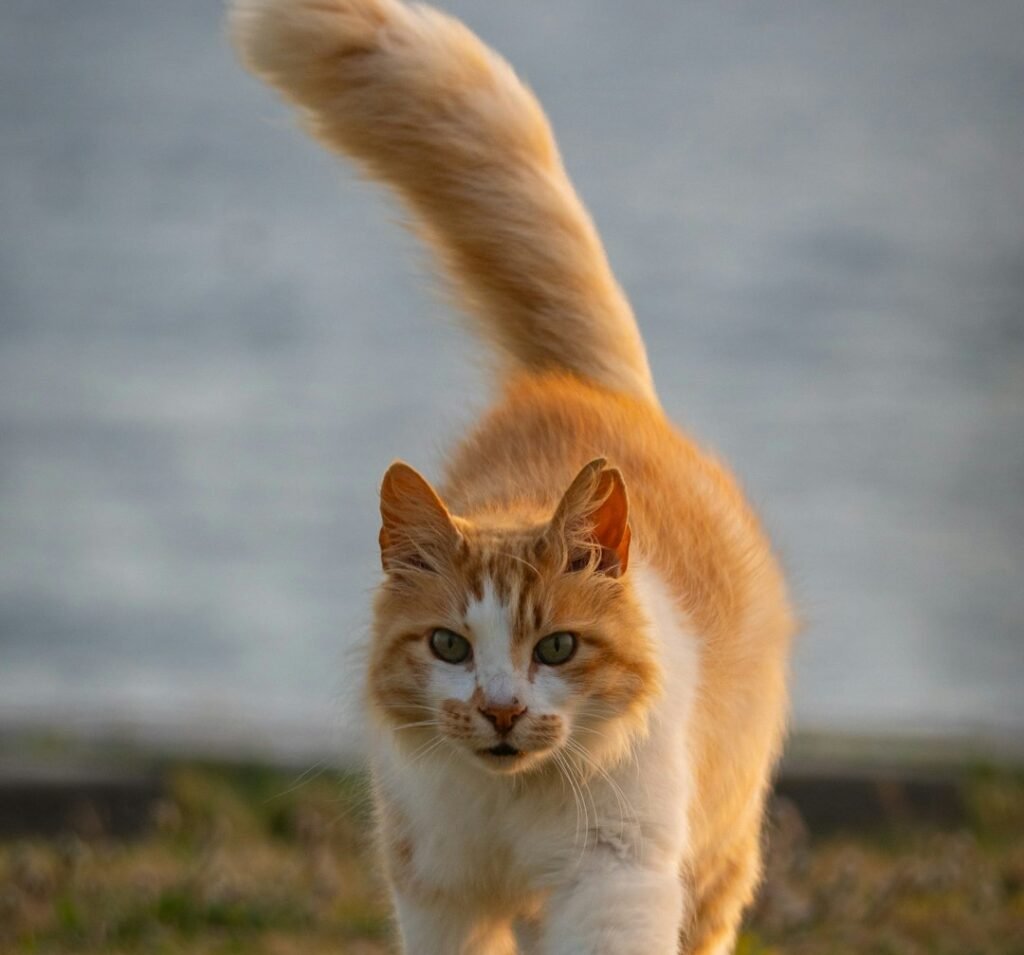Have you ever wondered if your feline friend truly cares about you? While dogs wear their hearts on their sleeves with tail wags and slobbery kisses, cats operate with more subtlety. They express their love through mysterious slow blinks, gentle headbutts, and even those annoying 4 AM wake-up calls that seem designed to test your patience.
Understanding your cat’s love language can transform your relationship completely. Those behaviors you might dismiss as typical cat weirdness are actually profound expressions of trust and affection. Let’s dive into the fascinating world of feline communication and discover what your cat has been trying to tell you all along.
Slow Blinking Is Your Cat’s Version of a Kiss

When your cat looks directly at you and slowly closes their eyes before opening them again, you’re witnessing something incredibly special. The slow blink is a sure sign that your cat loves you; it shows your buddy feels relaxed, content, and safe. This behavior isn’t random or accidental.
When your cat slowly blinks with half-closed eyes, it is a gesture of affection that shows huge contentment. Think about it from your cat’s perspective: in the wild, closing their eyes around another creature would be extremely dangerous. By slow blinking at you, they’re essentially saying they trust you completely with their life. Just as cats can slow blink to show you love, you can say “I love you” to a cat by slow blinking at them.
Head Bonks and Cheek Rubs Mark You as Family

That gentle bump your cat gives you with their forehead isn’t just cute behavior. Your cat may bump their head against you or rub their cheeks against you to show affection. Headbutting is often an attempt to mark you with their scent to claim you as one of their own. Your cat has scent glands located on their head and cheeks that produce pheromones.
Cats have scent glands on their heads, so when they headbutt you, they’re leaving their scent on you. They’re claiming you as part of their social group. This behavior, called bunting, is how cats identify members of their colony or family unit. When your cat rubs against you, they’re literally making you smell like them, which is their way of saying you belong together.
Purring Creates a Special Bond Between You

While purring might seem like an obvious sign of contentment, there’s much more depth to this behavior than most people realize. Cats often purr to show contentment when they are resting near you or when you’re petting them. However, purring serves multiple purposes beyond just expressing happiness.
Purring makes cats feel calm and secure. The purring can build a bond between felines and their humans. The vibrations from purring actually have therapeutic benefits for both you and your cat. But if your cat’s just hanging out at home and they’re near you, and suddenly you hear the motor go on, that’s a pretty good sign that they love you.
Kneading Shows You’re as Comforting as Mom

When your cat pushes their paws rhythmically against your lap or a soft blanket, they’re doing something called kneading or “making biscuits.” Cats begin kneading as tiny kittens when they are nursing. This behavior is the act of them doing a small little march on your leg, and it translates into affection in adult life. When your cat kneads you, they’re being very clear that you make them feel loved and comfortable.
This behavior is deeply rooted in your cat’s earliest memories of safety and nourishment. The rhythmic kneading cats do on blankets, pillows, or their humans is a behavior that mimics what they did while nursing as kittens. It’s just a leftover instinctual thing that they do when they feel super happy and super connected. When your cat kneads you, they’re essentially treating you like their mother figure.
Following You Around Means You’re Their Favorite Person

Does your cat seem to appear wherever you go in the house? Cats often follow those they love and trust around the home. This shadowing behavior is actually a significant compliment from your feline friend. Many pet parents might find it odd that their cats follow them everywhere they go, even right into the bathroom! But this just means that your cat wants to spend more time with you. A cat that enjoys your company and feels comfortable around you is going to follow you around the house and cling to you like glue.
Your cat doesn’t follow you because they’re bored or have nothing better to do. If you find that your cat follows you from room to room, this is a sign that they consider you a special companion to them. The reason they follow you around is quite obvious, they simply enjoy being around you and watching what you’re up to.
Bringing You “Gifts” Shows Ultimate Trust

While finding a dead mouse on your pillow might not feel like a present, it’s actually one of the highest honors your cat can bestow upon you. Oftentimes, cats show their affection by leaving presents for their caregivers to find. Cats are natural hunters, so when your kitty brings you freshly caught prey, they’re actually offering you a delicious meal.
Cats are natural hunters, and they only share their prey with someone they trust. So if your cat brings you a “present,” think of it as a sign of love. Indoor cats might bring you toys, hair ties, or other small objects instead of prey. Indoor cats, on the other hand, might bring toys, pieces of string, or whatever else they find around the house. Accept your cat’s gift in the spirit in which it was intended and give them a little treat, cuddle, or stroke to show your gratitude.
Showing Their Belly Demonstrates Complete Trust

When your cat rolls over and exposes their belly to you, they’re displaying the ultimate sign of vulnerability and trust. All of their organs are out in the open – stomach, kidney, heart – as both prey and predator, so for a cat to go on their back and show you their belly, they trust you not to hurt them. This behavior is particularly significant because the belly is a cat’s most vulnerable area.
Some cats roll around on the ground excitedly around their favorite people. It often happens when loved human companions first come home after being away. Cats are often protective of their vulnerable bellies, so anecdotally, it’s a major sign of trust and affection when a cat is so happy to see you that they roll around and invite you to pet their tummy.
Tail Talk Reveals Their True Feelings

Your cat’s tail position can tell you everything about how they feel toward you. Happy cats appear confident and relaxed, often walking with their tails held high and their ears relaxed when feeling comfortable and at home. If your cat greets you at the door with their tail held high and the tip slightly bent, it’s a sign of them being pleased to see you! Kittens often assume this posture with their mothers, so it shows your cat thinks of you as a loving, protective presence they’re happy to have around.
A slightly curled and forward tail usually indicates a cat is relaxed. If coming toward you with their tail up and curled, they really like you and they recognize you as a positive social interaction. Pay attention to how your cat carries their tail when they approach you versus how they hold it around strangers.
Greeting You at the Door Shows They Missed You

That excited meowing and leg weaving your cat does when you come home isn’t just random behavior. Your cat is trying to show you that they missed you when they greet you at the door. This is often followed by walking in-between your legs and curling their tail around your legs. Sometimes it’s also accompanied by meowing and “rattle-tail” behavior, where your cat will shake their tail quickly. This is your cat’s way of welcoming you home.
Your cat has the chance to show their affection every time that you walk through the door. Pets that rush to the front door when it’s opened, with a lot of meowing are trying to say that they’re happy to see you. This enthusiastic greeting ritual is your cat’s version of a happy dance.
Grooming You Includes You in Their Social Circle

When your cat licks your hand, arm, or hair, they’re not just being randomly affectionate. Cats groom each other as a display of affection, and this behavior will extend to humans when trust is built. Cats will often lick their people or allow them to brush them. Licking is similar to the grooming cats perform on their feline friends, allowing them to mark each other and build their bond.
Just as mother cats will groom their young, cats who are bonded with each other will often groom one another, showing comfort and familial acceptance. If you find your kitty licking you repetitively, you’ve either spilled something delicious on yourself or they see you as a close family member. This grooming behavior is called allogrooming, and it’s reserved for family members and trusted companions.
Loud Noises and Sudden Sounds Frighten Them

Now that you understand how your cat shows love, it’s equally important to know what makes them uncomfortable. cats hate sudden loud noises and excessive noise can be very frightening for them. As much as you might enjoy blasting your favourite spotify playlist, it’s probably worth considering how this might be making your pet feel.
Cats have very sensitive hearing and loud noises can be startling and even downright frightening. Things such as vacuum cleaners and other household appliances, loud music, loud TV, people shouting, and construction noises can add stress. Many cats are terrified of fireworks, thunder and loud car noises such as honking, backfires and screeching tires. Raucous parties and arguing humans are also on the list of things that disturb cats. Your cat’s hearing is much more sensitive than yours, so what seems like a normal volume to you might be overwhelming for them.
Forced Interactions and Overstimulation

While cats crave affection, they want it strictly on their own terms. Cats hate forced interaction. Let cats come to you. This includes forced hugging, excessive petting, and being held when they don’t want to be. There’s nothing cats hate more than an overbearing pet-parent. They can’t stand over-aggressive petting and many of them just like doing their own thing. Respect your cat’s boundaries and don’t try to force them to spend time with you if they don’t want to- they will let you know when they need love and affection!
If you’ve ever been calmly petting a cat only to suddenly be bitten or scratched, you’ve experienced what happens when a cat is overstimulated. Getting to know your cat’s body language will help you understand where and how they like to be petted, and for how long. Watch for signs like tail flicking, ears flattening, or skin rippling along their back.
Changes in Their Environment Cause Stress

Cats are creatures of habit who thrive on routine and predictability. Cats are definitely creatures of habit, and sudden changes in their environment or everyday life can be distressing. This ranges from the introduction of a new pet, moving to a new home, change in food or litter brand, or rearranging furniture. Even events that people view as very minor can be stressful for unsuspecting cats.
Noise, strange people, too much petting, dirty litter boxes, and significant changes are common pet hates that leave your cat anxious or annoyed. What might seem like a minor adjustment to you could completely disrupt your cat’s sense of security. Whether you’re moving furniture, bringing home new furniture with unfamiliar smells, or changing their feeding schedule, your cat notices everything.
Strong Scents and Citrus Smells

Your cat’s sense of smell is incredibly powerful, and certain scents that humans enjoy can be offensive or even harmful to them. The citrus smell is really irritating to cats. They can’t stand citrus and as much as you might love the smell of fresh herbs, cats hate rosemary and thyme. Banana and mustard are a big no-no too, as well as lavender and eucalyptus.
A cat’s sense of smell is about 14 times stronger than that of a human. Is it any wonder they can pick up on odors our simple human noses cannot? But cats don’t just hate the way certain things smell, strong odors can be dangerous for our feline friends too. Strong perfumes, cleaning products, and air fresheners can overwhelm their sensitive noses and even cause respiratory irritation.
Dirty Litter Boxes and Neglected Spaces

Just as you wouldn’t want to use a filthy bathroom, your cat detests having to use a dirty litter box. No one likes to use a dirty bathroom, cats included. Scoop your kitty’s box daily and change the litter and clean the box about every two weeks to prevent problems. Nobody appreciates bathrooms that have stayed dirty for a long time, nor do cats. If a litter box is fully packed, strongly odorous, or has not been cleaned in a long time, your cat may even avoid it altogether. A clean box directly translates into a happy cat, implying fewer carpet accidents.
Beyond the litter box, cats also appreciate clean food and water bowls, fresh food, and tidy sleeping areas. They’re naturally clean animals who spend a significant portion of their day grooming themselves, so they expect their environment to match their standards.
Your relationship with your cat is built on mutual respect and understanding. By recognizing these ten beautiful ways your cat expresses love and avoiding the five things that stress them out, you’re creating a foundation for a deeper, more meaningful bond. Remember that every cat is unique, and learning your specific cat’s preferences and personality quirks will strengthen your connection even further. What do you think about your cat’s way of showing affection? Tell us in the comments.





